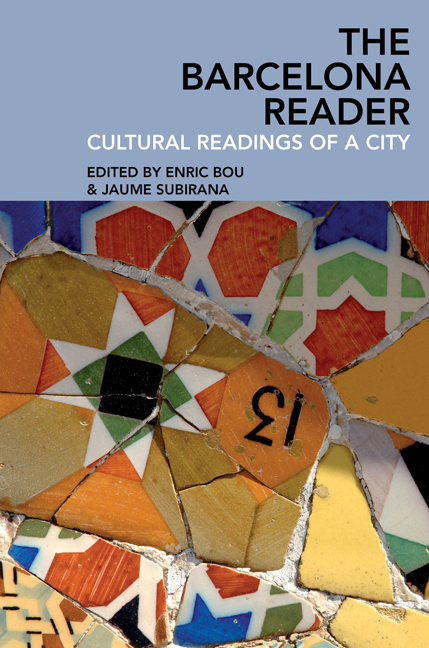Book contents
- Frontmatter
- Contents
- List of illustrations
- Notes on contributors
- Introduction: Barcelona: Cultural readings of a city
- I City, history, and territory
- II City and society
- 6 Barcelona and modernity
- 7 Football and identities in Catalonia
- 8 The family and the city: Power and the creation of cultural imagery
- 9 Memory and the city in Barcelona's cemeteries
- III Art, architecture, and the city
- IV The Olympics and the city
- V Literature, cinema, and the city
7 - Football and identities in Catalonia
from II - City and society
- Frontmatter
- Contents
- List of illustrations
- Notes on contributors
- Introduction: Barcelona: Cultural readings of a city
- I City, history, and territory
- II City and society
- 6 Barcelona and modernity
- 7 Football and identities in Catalonia
- 8 The family and the city: Power and the creation of cultural imagery
- 9 Memory and the city in Barcelona's cemeteries
- III Art, architecture, and the city
- IV The Olympics and the city
- V Literature, cinema, and the city
Summary
Catalonia is dying. They are killing her and we have to react. (Joan Laporta, President of F.C. Barcelona)
On 10 July 2010 hundreds of thousands took to the streets of Barcelona behind the slogan ‘We are a nation’. The demonstration was supported by all Catalan parties with the exception of the conservative People's Party and the anti-Catalanist Ciutadans and was reported as the biggest in the history of Catalonia. The protest was conceived as a response to the Spanish Constitutional Court, which had published a review of the region's revised statute of autonomy denying that Catalonia was a nation in its own right. The day after the demonstration, Spain won the Football World Cup for the first time.
Thousands of Catalans celebrated the triumphs of the selección española in Barcelona. The streets of the Catalan capital were taken by a tide of young supporters in red T-shirts waving Spanish constitutional flags and proudly chanting ‘I am Spanish, Spanish, Spanish’.
These two patriotic displays in the same city in the space of 24 hours are good indicators of the plurality of national identities in Catalonia. In the Principality the exhibitions of Catalan and Spanish identities in public is fairly common and not always antagonistic. In fact, most people hold dual identities and find feeling both Catalan and Spanish unproblematic. Yet, despite this high level of dual patriotism and multiple loyalties, Catalonia is also a territory of nationalist confrontation. Over a century, Catalan and Spanish nationalisms have competed for political and cultural hegemony in the Principality and football has been an important device in the creation and promotion of identities and narratives in this prolonged conflict. Fútbol Club (F.C.) Barcelona was associated with bourgeois Catalan regionalists from the beginning of the twentieth century, whereas its local arch-rivals, Real Club Deportivo (R.C.D.) Español, found support among many in the Barcelona pro-Spanish middle and working classes. F.C. Barcelona's public support for the 1918 Lliga Regionalista campaign in favour of Catalan political autonomy; the club's clashes with the dictatorship of Primo de Rivera; and the institution's backing of the 1932 Catalan Statute of Autonomy consolidated the Catalanist representation of ‘Barça’ as the symbol of Catalonia.
- Type
- Chapter
- Information
- The Barcelona ReaderCultural Readings of a City, pp. 163 - 184Publisher: Liverpool University PressPrint publication year: 2017



